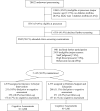Effect of a Long-Term Intensive Lifestyle Intervention on Cognitive Function: Action for Health in Diabetes Study
- PMID: 28067945
- PMCID: PMC5435531
- DOI: 10.1111/jgs.14692
Effect of a Long-Term Intensive Lifestyle Intervention on Cognitive Function: Action for Health in Diabetes Study
Abstract
Objectives: To assess whether randomization to 10 years of lifestyle intervention to induce and maintain weight loss improves cognitive function.
Design: Randomized controlled clinical trial.
Setting: Data obtained as part of the Action for Health in Diabetes (Look AHEAD) trial (NCT00017953) and Look AHEAD Continuation study (U01 DK057136-15).
Participants: Overweight and obese individuals with type 2 diabetes mellitus aged 45 to 76 (N = 3,751).
Intervention: Intensive lifestyle intervention (ILI) for weight loss through reduced caloric intake and increased physical activity compared with a control condition of diabetes support and education (DSE).
Measurements: Certified examiners who were masked to intervention assignment administered a standard battery of cognitive function tests (Modified Mini-Mental State Examination, Rey Auditory Verbal Learning Test, Digit Symbol Coding, Trail-Making Test, Modified Stroop Color-Word Test) to participants 10 to 13 years after enrollment.
Results: Assignment to lifestyle intervention was not associated with significantly different overall (P = .10) or domain-specific (all P > .10) cognitive function than assignment to diabetes support and education. Results were fairly consistent across prespecified groups, but there was some evidence of trends for differential intervention effects showing modest harm in ILI in participants with greater body mass index and in individuals with a history of cardiovascular disease. Cognitive function was not associated with changes in weight or fitness (all P > .05).
Conclusion: A long-term behavioral weight loss intervention for overweight and obese adults with diabetes mellitus was not associated with cognitive benefit. Trial Registration clinicaltrials.gov Identifier: NCT00017953.
Keywords: cognition; diabetes mellitus; intervention; obesity; weight loss.
© 2017, Copyright the Authors Journal compilation © 2017, The American Geriatrics Society.
Conflict of interest statement
Elements of Financial/Personal Conflicts SRR JAL LDB GLB, HPH, KED-McD, RWJ, JNK, JMMcC, NMP, ME, TAW, SEA, MAE Yes No Yes No Yes No Yes No x x x x x x x x x x x x x x x x x x x x x x x x x x x x x x x x x x x x x x x x x x x x *Authors can be listed by abbreviations of their names. For “yes” x mark(s): give brief explanation below:
Figures
References
-
- Norton S, Matthews FE, Barnes DE, Yaffe K, Brayne C. Potential for primary prevention of Alzheimer’s disease: an analysis of population-based data. Lancet Neurol. 2014;13:788–794. - PubMed
-
- Gustafson D, Rothenberg E, Blennow K, Steen B, Skoog I. An 18-year follow-up of overweight and risk of Alzheimer disease. Arch Intern Med. 2003;163:1524–1528. - PubMed
-
- Kivipelto M, Ngandu T, Fratiglioni L, Viitanen M, Kareholt I, Winblad B, Helkala EL, Tuomilehto J, Soininen H, Nissinen A. Obesity and vascular risk factors at midlife and the risk of dementia and Alzheimer disease. Arch Neurol. 2005;62:1556–1560. - PubMed
-
- Arvanitakis Z, Wilson RS, Bienias JL, Evans DA, Bennett DA. Diabetes mellitus and risk of Alzheimer disease and decline in cognitive function. Arch Neurol. 2004;61:661–666. - PubMed
-
- van den Berg E, Kloppenborg RP, Kessels RP, Kappelle LJ, Biessels GJ. Type 2 diabetes mellitus, hypertension, dyslipidemia and obesity: A systematic comparison of their impact on cognition. Biochim Biophys Acta. 2009;1792:470–481. - PubMed
Publication types
MeSH terms
Associated data
Grants and funding
- U01 DK057182/DK/NIDDK NIH HHS/United States
- U01 DK057135/DK/NIDDK NIH HHS/United States
- U01 DK057149/DK/NIDDK NIH HHS/United States
- K24 AG045334/AG/NIA NIH HHS/United States
- P30 DK026687/DK/NIDDK NIH HHS/United States
- U01 DK057078/DK/NIDDK NIH HHS/United States
- U01 DK057151/DK/NIDDK NIH HHS/United States
- U01 DK057008/DK/NIDDK NIH HHS/United States
- P30 DK048520/DK/NIDDK NIH HHS/United States
- U01 DK057136/DK/NIDDK NIH HHS/United States
- U01 DK057154/DK/NIDDK NIH HHS/United States
- K01 DK090445/DK/NIDDK NIH HHS/United States
- U01 DK057131/DK/NIDDK NIH HHS/United States
- U01 DK057171/DK/NIDDK NIH HHS/United States
- P30 DK017047/DK/NIDDK NIH HHS/United States
- U01 DK057219/DK/NIDDK NIH HHS/United States
- U01 DK057002/DK/NIDDK NIH HHS/United States
- U01 DK056992/DK/NIDDK NIH HHS/United States
- U01 DK057177/DK/NIDDK NIH HHS/United States
LinkOut - more resources
Full Text Sources
Other Literature Sources
Medical


